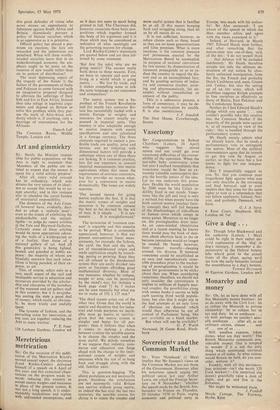Meretricious metrication
Sir: On the occasion of the publi- cation of the Metrication Board's second annual report, the chairman (Lord Ritchie-Calder) delivered himself of a speech on 6 April of this year. and this contained obser- vations on the progress made to- wards inducing • this country to accept metric weights and measures in place of the present system. It was not a long speech, it is under- standably tendentious and replete With unfounded assumptions, and so it does not seem to merit being printed in full. The Chairman did, however, enunciate three basic pro- positions which together formed the body of his argument and it is these which may be considered as indicative of what seemingly are the governing reasons for change.
Lord Ritchie-Calder's statements are quoted below and are then fol- lowed by some comment.
'But first [he asks] why are we going metric? The answer really boils down to three reasons. First, we have to operate and earn our living in a world which is going metric . . . We live by trade, and it makes compelling sense to talk the same language as our customers and competitors.'
The metric system was a by- product of the French Revolution and for nearly two centuries Bri- tain has successfully traded with a metric Europe in weights and measures for export usually ex- pressed in imperial units. This country is also adaptable enough to receive imports with metric specifications and also calculated in a foreign currency. The three elements required to sustain a pro- fitable trade are quality, price and service, and no tinkering with dimensional factors will provide a substitute where any of these three are lacking. It is common practice, too, for our exporters to convert imperial measurements into metric equivalents where this meets the requirements of overseas customers, but this provides no reason what- ever for a conversion to metric domestically. The issues are widely separate.
'The second reason for going metric explains the first. It is that the metric system of weights and measures is by common consent the best so far devised by the wit of man. It is simple . . . It is sys- tematic . . . It is straightforward.'
The invocation of 'common con- sent' is arguable and this remains to be proved. What is commonly appreciated, however, is that our present conventional linear meas- urements, for example, the fathom, the yard, the foot and the inch, are of unsophisticated origin and ready application simply by stretch- ing, pacing or pointing. Since they are all related to the duodecimal system they are easily divided into parts or fractions affording great mathematical diversity. Most of our measures, whether by volume, weight or area, can be perceived by the mind's eye; for instance a book page sized 71- by 5 inches can be seen mentally but what are we to make of 192 x 127 mm?
'The third reason arises out of the other two. Given that the world is metric and therefore that for indus- trial and trade purposes we inevit- ably must go metric to survive: given that the metric system is simpler and better for all pur- poses: then it follows that when it comes to making a choice between systems the sensible course is to choose the simpler and the most useful. We delude ourselves if we suppose that industry, com- merce and education can forge ahead with the change to the inter- national system of weights and measures while the rest of us hang back and struggle along with the old, familiar units.'
This is question-begging. The above postulates are not necessarily given, therefore the conclusions are not necessarily valid. Britain can survive without going metric, as indeed she has over the last two centuries; the sensible course for choice is to retain the simpler and
more useful system that is familiar to us all. If this means hanging back and struggling along, then let us by all means do so.
It is not sufficient, however, to refute claims such as these, based as they are on loose generalisations and false premises. What is more insidious is the constant pressure and persuasion exerted by the Metrication Board to accomplish its purpose of national conversion by two means: by dissemination of incessant propaganda so as to in- duce the country to regard the dis- tant end as an accomplished fact; and by goading sections of indus- try and commerce (timber, print- ing and pharmaceuticals, for ex- ample) without consultation or consent of the public.
This is a subversive process, a form of conspiracy, it may be de- scribed as metrication by stealth. It is also meretricious.
J. F. Standish The Oast House, Crowborough, Sussex






































 Previous page
Previous page